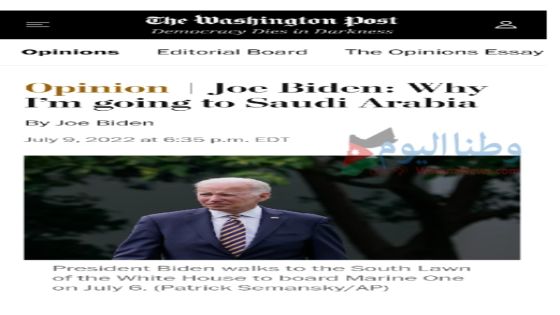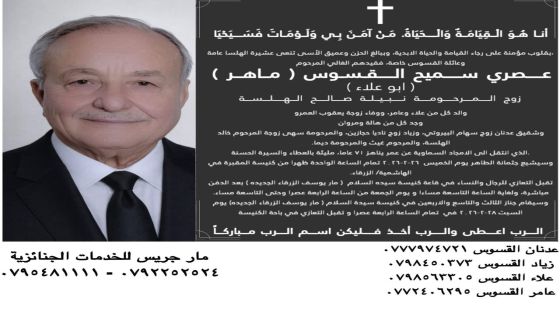Joe Biden is president of the United States
Next week, I’ll travel to the Middle East to start a new and more promising chapter of America’s engagement there. This trip comes at a vital time for the region, and it will advance important American interests.
Sign up for a weekly roundup of thought-provoking ideas and debates
A more secure and integrated Middle East benefits Americans in many ways. Its waterways are essential to global trade and the supply chains we rely on. Its energy resources are vital for mitigating the impact on global supplies of Russia’s war in Ukraine. And a region that’s coming together through diplomacy and cooperation — rather than coming apart through conflict — is less likely to give rise to violent extremism that threatens our homeland or new wars that could place new burdens on U.S. military forces and their families.
Avoiding that scenario is of paramount importance to me. I’ll pursue diplomacy intensely — including through face-to-face meetings — to achieve our goals.
The Middle East I’ll be visiting is more stable and secure than the one my administration inherited 18 months ago.
One month before my inauguration, our embassy in Baghdad faced the largest rocket attack in a decade. Attacks against our troops and diplomats had increased fourfold over the preceding year. My predecessor repeatedly ordered B-52 bombers to fly from the United States to the region and back again to deter these attacks. But it didn’t work, and the attacks continued.
The war in Yemen was escalating, creating one of the world’s worst humanitarian crises, with no political process in sight to end the fighting.
After my predecessor reneged on a nuclear deal that was working, Iran had passed a law mandating the rapid acceleration of its nuclear program. Then, when the last administration sought to condemn Iran for this action in the U.N. Security Council, the United States found itself isolated and alone.
In my first weeks as president, our intelligence and military experts warned that the region was dangerously pressurized. It needed urgent and intensive diplomacy. To restore deterrence, I ordered airstrikes in response to the attacks against our troops and began serious diplomatic outreach to bring about a more stable region.
In Iraq, we ended the U.S. combat mission and transitioned our military presence to focus on training Iraqis, while sustaining the global coalition against the Islamic State we forged when I was vice president, now dedicated to preventing ISIS from resurging. We’ve also responded to threats against Americans. The frequency of Iranian-sponsored attacks compared with two years ago has dropped precipitously. And this past February, in Syria, we took out ISIS leader Haji Abdullah, demonstrating America’s capability to eliminate terrorist threats no matter where they try to hide
.
Yemen, I named an envoy and engaged with leaders across the region, including with the king of Saudi Arabia, to lay the foundation for a truce. After a year of our persistent diplomacy, that truce is now in place, and lifesaving humanitarian assistance is reaching cities and towns that had been under siege. As a result, the past few months in Yemen have been the most peaceful in seven years.
With respect to Iran, we reunited with allies and partners in Europe and around the world to reverse our isolation; now it is Iran that is isolated until it returns to the nuclear deal my predecessor abandoned with no plan for what might replace it. Last month, more than 30 countries joined us to condemn Iran’s lack of cooperation with the International Atomic Energy Agency on its past nuclear activities. My administration will continue to increase diplomatic and economic pressure until Iran is ready to return to compliance with the 2015 nuclear deal, as I remain prepared to do.
In Israel, we helped end a war in Gaza — which could easily have lasted months — in just 11 days. We’ve worked with Israel, Egypt, Qatar and Jordan to maintain the peace without permitting terrorists to rearm. We also rebuilt U.S. ties with the Palestinians. Working with Congress, my administration restored approximately $500 million in support for Palestinians, while also passing the largest support package for Israel — over $4 billion — in history. And this week, an Israeli prime minister spoke with the president of the Palestinian Authority for the first time in five years.
Story continues below advertisement
In Saudi Arabia, we reversed the blank-check policy we inherited. I released the intelligence community’s report on the murder of Jamal Khashoggi, issued new sanctions, including on the Saudi Arabia’s Rapid Intervention Force involved in his killing, and issued 76 visa bans under a new rule barring entry into the United States for anyone found to be involved in harassing dissidents abroad. My administration has made clear that the United States will not tolerate extraterritorial threats and harassment against dissidents and activists by any government
We also advocated for American citizens who had been wrongfully detained in Saudi Arabia long before I took office. They have since been released, and I will continue to push for restrictions on their travel to be lifted.
From the start, my aim was to reorient — but not rupture — relations with a country that’s been a strategic partner for 80 years. Today, Saudi Arabia has helped to restore unity among the six countries of Gulf Cooperation Council, has fully supported the truce in Yemen and is now working with my experts to help stabilize oil markets with other OPEC producers.
I know that there are many who disagree with my decision to travel to Saudi Arabia. My views on human rights are clear and long-standing, and fundamental freedoms are always on the agenda when I travel abroad, as they will be during this trip, just as they will be in Israel and the West Bank.

















